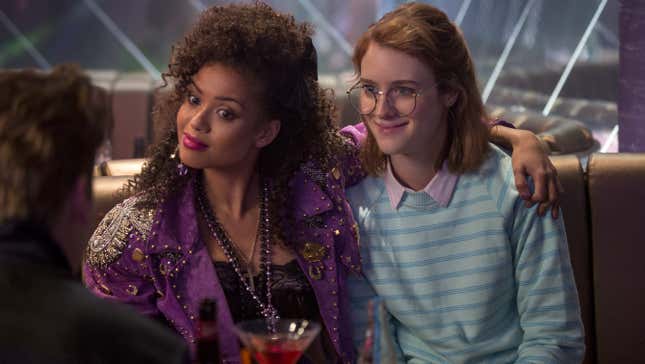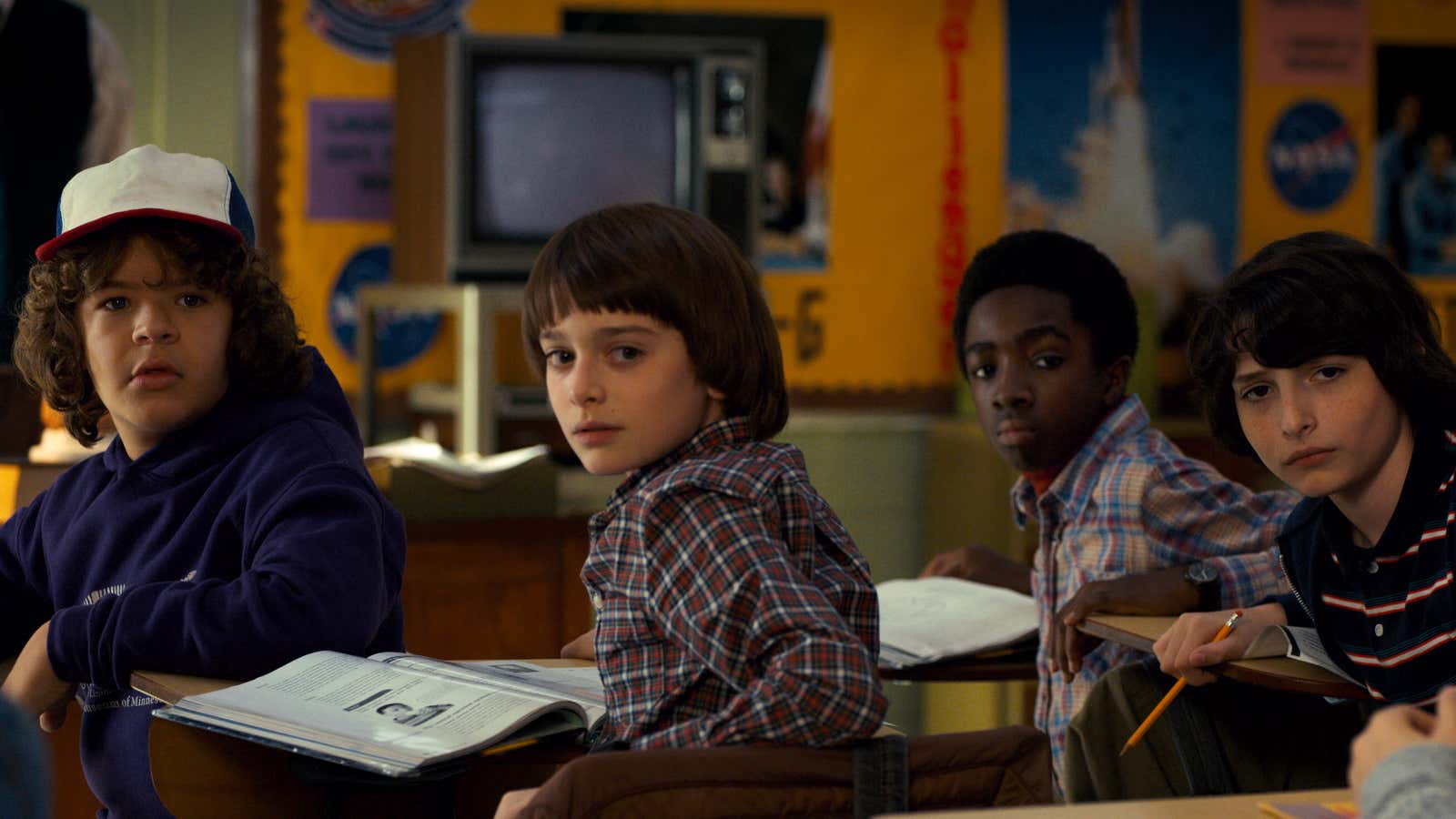This may be a “golden age of TV,” with some of the finest storytelling in Hollywood designed for the small screen—but it’s also the era of “peak TV,” which really just means “too much TV.” There is far too much for any reasonable person to watch (or even a TV critic). Countless friends and colleagues tell me that they “just can’t even” with choosing TV shows right now.
And as binge-watching increasingly becomes the norm, television is becoming a serious time commitment. Netflix announced recently that we have entered the era of “binge-racing,” in which millions of super-fans will watch an entire season of a show (ahem, Stranger Things) within 24 hours of its release. More broadly, Americans spent an average of 2.7 hours a day watching TV in 2016, four times as long as they spent socializing, according to the US Department of Labor.
But what shows are actually worthy of this kind of time commitment? It’s often very hard to know.
The bewildering profusion of choices—from various eras of the past up to the present—means that flicking on the TV often sends one into a spasm of choice paralysis. It’s not uncommon to feel totally overwhelmed and end up just not watching anything, or reverting to series you’ve already seen.
There’s no easy way to skip the massive TV buffet: There’s no a la carte system that will deliver just the shows and channels you like to your TV. Cable packages force you to pay for a massive slate of programming you don’t want, to get the stuff you do. Streaming services were supposed to help solve this issue, but with so many of them now and so much content spread across each service, it has become arguably even more cumbersome to navigate.
Quartzy is here to help! One way to approach this conundrum is to narrow your choices to a format that works for your TV-watching disposition. To start, ask yourself: What kind of cultural consumer are you?
You’re commitment-phobic

Are you afraid of committing to a serious relationship? Do you still want the benefits of a meaningful relationship? That’s okay. There’s a way to experience the payoff of an entertaining story without the time or emotional investment of a several-seasons-long show.
It’s called the anthology.
Anthology shows—more like short story collections than epic novels—are becoming increasingly popular across the TV industry. They’re quick and easy, and you can watch them any way you want. You can watch them every day, spread episodes or seasons out over a long period of time, or consume an entire season in a weekend. They’re as close to bespoke as TV can get. Anthology shows come in various formats:
Two great anthology shows that tell a different story each episode:
- The Twilight Zone (CBS | five seasons | 156 episodes | available on Hulu)
- Black Mirror (Netflix | three seasons | 13 episodes)
If you’re up for a bit more commitment, there’s medium-range option within the anthology format: shows that tell a new story in each season of the show, usually connected by a shared aesthetic, setting, or theme, but with entirely new characters:
Two great anthology shows with a different story each season:
- Fargo (FX | three seasons | 30 episodes)
- True Detective (HBO | two seasons | 16 episodes)
If you fall into this category, another option is to snack on a show that only ran for one season. Fair warning: Some of these shows don’t tie deliver a neat emotional payoff at the end, as they may have intended to air for more seasons. Several are still totally worth watching:
Five great one-season shows:
- Terriers (FX | 13 episodes)
- Kings (NBC | 13 episodes)
- Firefly (Fox | 14 episodes)
- Freaks and Geeks (NBC | 18 episodes)
- Rubicon (AMC | 13 episodes)
There’s one last category for the investment-averse: the miniseries. They are, by definition, limited—miniseries stories are usually too long or intricate to tell in a feature-length film, but too self-contained or defined by one event to actually turn into a regular TV show. Here are some of the best (you’ll notice most of them are on HBO):
Five great miniseries:
- Big Little Lies (HBO | seven episodes)
- John Adams (HBO | seven episodes)
- Band of Brothers (HBO | 10 episodes)
- Roots (ABC | eight episodes)
- Angels in America (HBO | six episodes)
If none of the above works, then TV probably just isn’t for you. Go watch a movie.
You’re in it for the long haul

Did you read War and Peace without wanting to die? With all due respect to Mr. Tolstoy, his 1,200-page historical epic can most generously be described as “a slog.” The polar opposite of the commitment-phobes above, this person only wants to experience something if she can really dig her hands into it, pick it apart from several angles, and feel as though she has an important emotional connection to the material. Love takes time.
If you’re such a completionist, the choice of what to watch is even more fraught. Investing in a TV series is like entering a long-term relationship. It’s a new thing to care for, attend to, nourish. A TV show needs your undivided time and energy. You have to be prepared for that when you click play on the first episode.
But you, too, are in luck: Television offers a host of sweeping, convoluted (in a good way, we swear!) stories to spend many waking hours consuming. Should you realize that you fall into this category, there are a few behemoths you might attempt to slay:
The seven Moby Dicks of TV:
- The Simpsons (Fox | 29 seasons | 62o episodes)
- Star Trek: The Next Generation (CBS | seven seasons | 178 episodes)
- Law & Order (NBC | 20 seasons | 456 episodes)
- Seinfeld (NBC | nine seasons | 180 episodes)
- ER (NBC | 15 seasons | 331 episodes)
- NYPD Blue (ABC | 12 seasons | 261 episodes)
- The X-Files (Fox | 10 seasons | 208 episodes)
There are also a group of shows that require serious investment (both emotional and temporal) and patience but don’t necessarily demand you go into hibernation for months on end. Try one of these smaller epics, perfect for the person who doesn’t have the time to read War and Peace but would totally watch a TV show based on it:
Five epic shows you can watch in full before 2018:
- Lost (ABC | six seasons | 121 episodes)
- Game of Thrones (HBO | seven seasons | 67 episodes)
- Buffy the Vampire Slayer (The WB/UPN | seven seasons | 144 episodes)
- The Sopranos (HBO | six seasons | 86 episodes)
- Friday Night Lights (NBC | five seasons | 76 episodes)
Only true love will do for you

Your life hasn’t been quite the same since The Wire ended. You probably have told your friends 30 times that they must watch David Simon’s Dickensian epic of the Baltimore drug trade. You pride yourself on your good taste and emotional depth, and you sometimes annoy your friends by randomly saying things like “It’s all in the game, yo” or “Omar comin’.”
We have news for pushers of The Wire: There are other brilliant shows that feature great characters, interweaving plot lines, and sociopolitical relevance. And they’re not all made by David Simon:
Five shows similar to The Wire in length, tone, and scope
- The Americans (FX | five seasons | 65 episodes)
- Breaking Bad (AMC | five seasons | 62 episodes)
- The West Wing (NBC | seven seasons | 156 episodes)
- Justified (FX | six seasons | 78 episodes)
- Mad Men (AMC | seven seasons | 92 episodes)
